Looking for a CRM (Customer Relationship Management) system for your ecommerce business? We've compared the best ecommerce CRM platforms based on features, strengths, and pricing.
At a glance: Ecommerce CRMs
An ecommerce CRM is a specialized customer relationship management system designed for online businesses. Its main function is to centralize customer data, including browsing history, purchase behavior, and communication across various channels like email, social media, and live chat.
Potential benefits of ecommerce CRMs:
- Improved customer retention
- Increased revenue
- Better efficiency
Top ecommerce CRMS:
- Brevo
- Metrilo
- Klaviyo
- Omnisend
- Freshworks
Ecommerce can look totally different depending on what you sell.
High-ticket stores deal with leads, customer questions, consultations, and post-sale support. Low-ticket, self-service shops focus more on smooth customer journeys and personalized automations — and that’s if we generalize heavily.
When you see a shiny website offering an “ecommerce CRM,” which type of store does it actually serve? With all the “all-in-one” options out there, it’s no wonder it feels confusing.
We’ve analyzed 11 best CRM software for ecommerce and highlighted the areas where each one is best at.
Table of contents
What makes a good ecommerce CRM
Just because a platform calls itself an ecommerce CRM doesn’t mean it’s automatically the right fit. The right one should tick these boxes:
1. Integration ecosystem
Your CRM should connect directly with your ecommerce platform (Shopify, WooCommerce, Magento, etc.) so order history, customer details, and browsing behavior flow in automatically.
Beyond your storefront, check for integrations with accounting software, shipping solutions, and loyalty programs.
2. Unified customer profiles
Every interaction, such as purchases, support tickets, emails, and chats, should be stored in one place. You should be able to see the customer's full journey from first visit to repeat purchase.
3. Advanced segmentation
Look for tools that let you segment customers based on behavior, order value, purchase frequency, location, and more.
4. Automation for key touchpoints
Your CRM should handle automated workflows for cart recovery, upsells, cross-sells, post-purchase follow-ups, and win-back campaigns. And ideally, you shouldn’t need a developer to set them up.
5. Multichannel capabilities
A strong ecommerce CRM should support email, SMS, push notifications, chat, and possibly WhatsApp or social DMs.
6. Performance tracking and attribution
Campaign reporting should go beyond open and click rates to show sales attribution, repeat purchase rates, and customer lifetime value.
7. Ease of use for the team
CRM systems are often unnecessarily complicated. The interface should be intuitive, with minimal training required, so sales, marketing, and support can work from the same playbook.
8. Scalability and flexibility
This is the biggest pitfall business owners often stumble upon with their CRM. A lot of systems get expensive fast once you hit the limits of the entry-level plan.
As your store grows, your CRM should handle more contacts, more orders, and more complex automations without grinding to a halt or forcing a costly migration.
11 Best ecommerce CRMs compared
Disclaimer: This article covers the best ecommerce CRMs, including our platform, Brevo. The following recommendations are based on use case, market share, and customer testimonials. We do not earn commissions from any affiliate links in this article.
The information below was last updated on September 8, 2025.
1. Brevo
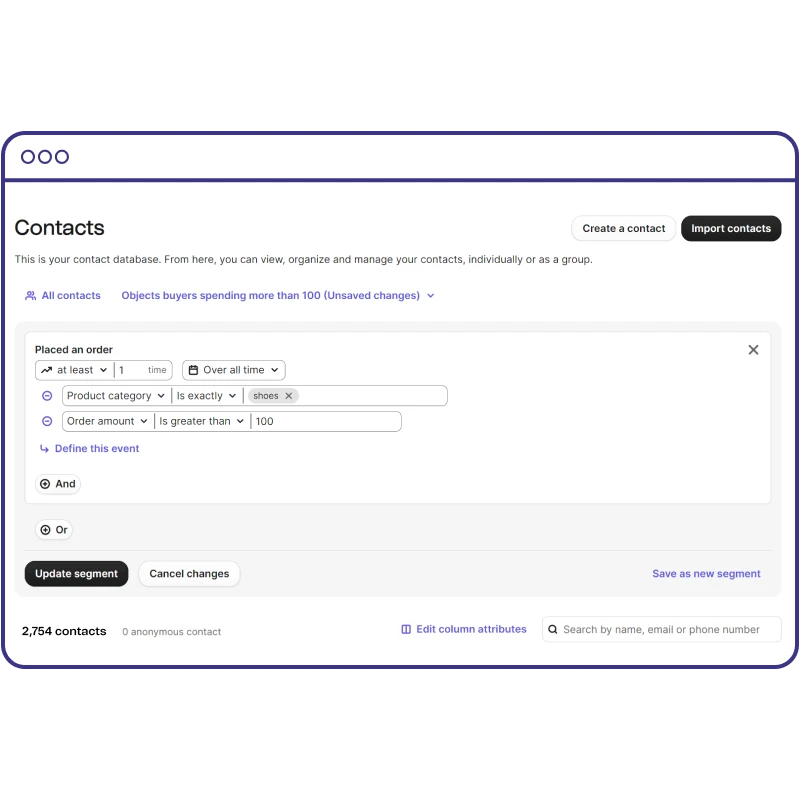
Brevo (formerly Sendinblue) is an all-in-one sales and marketing platform that includes strong CRM features tailored for ecommerce. It combines email, SMS, live chat, and automation tools in one place.
What makes Brevo stand out on this list? To strengthen its ecommerce offering, Brevo acquired three specialized tools:
- Metrilo — an ecommerce CRM and analytics platform.
- Chatra — a live chat app for online stores.
- PushOwl — a web push notifications tool for cart recovery and re-engagement.
All of these, combined with Brevo’s email and SMS marketing system, create a one-stop shop for ecommerce brands, big or small.
If you rely on customer service and prompt communication for high-ticket sales — Brevo gives you the tools. If you need to map out smooth customer experiences with automated campaigns, brevo does it, too.
Key features for ecommerce
- Built-in CRM with unlimited contact storage
- Granular customer segmentation based on real-time sales data
- Multichannel campaigns, including email marketing, SMS, chat, WhatsApp marketing, and push notifications
- Automated personalized workflows for cart abandonment, upsells, and cross-sells
- Transactional messages across email and SMS
- Rich email template gallery
- AI content generation
- Dynamic email and SMS personalization
- Detailed real-time ecommerce analytics and reporting
- Integrations with all the leading ecommerce and retail platforms, including Shopify, WooCommerce, and PrestaShop
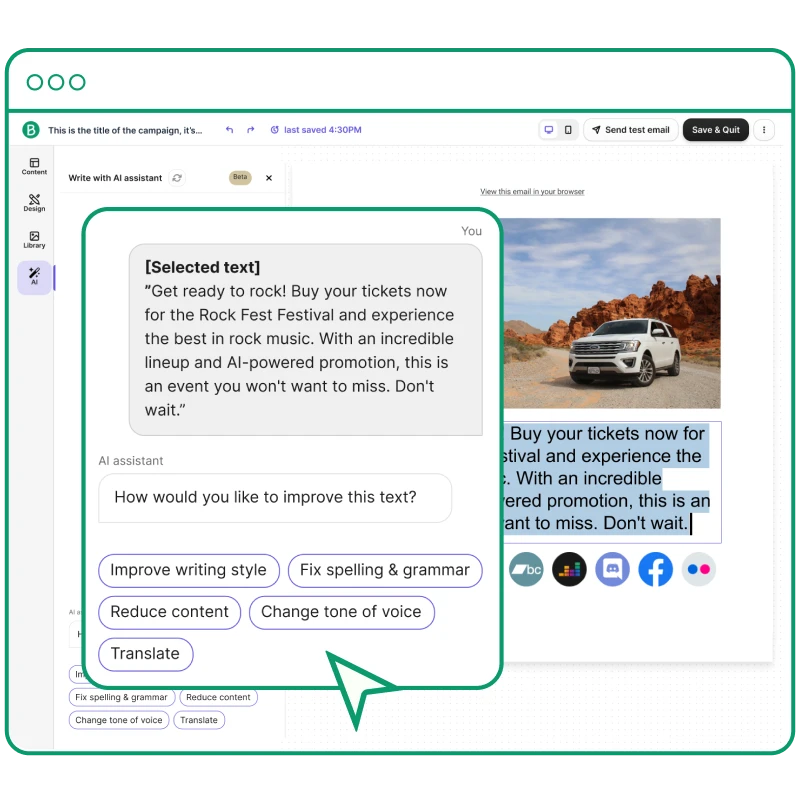
Brevo pricing
Brevo is available for free for up to 300 emails/day. SMS marketing, workflow automation, and transactional emails are also included in the free plan.
Paid plans start at $9/month for 5,000 emails/month. At $18/month, users access advanced tools like A/B testing, landing page builder, AI-powered send time optimization, heat map reporting, and more.
2. Metrilo
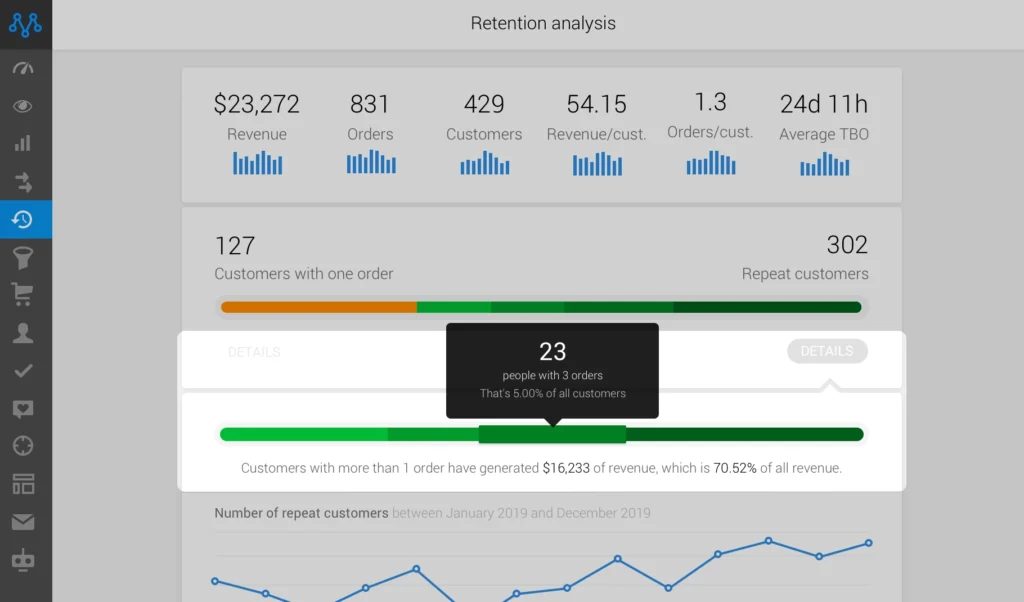
Metrilo is an ecommerce CRM and analytics platform that was acquired by Brevo. While it’s still available as a standalone tool, many of its core features — like customer segmentation, retention tracking, and sales analytics — are now built into Brevo’s all-in-one platform.
Metrilo was designed specifically for online stores and focused heavily on helping brands understand customer behavior and boost retention. It’s a good fit for ecommerce businesses that want deep analytics.
Key features for ecommerce
- Deep ecommerce performance analytics
- Built-in CRM tailored for online store workflows
- Customer segmentation based on shopping behavior, purchase history, and more
- Retention analysis and customer lifetime value tracking
- Email marketing with pre-built templates and automation features
- Integrations with Shopify, WooCommerce, and Magento
Metrilo pricing
Metrilo’s pricing starts at $199/month for ecommerce analytics. If you want access to the CRM and retention analysis features, plans start at $379/month. Full access, including email marketing, starts at $599/month.
3. Klaviyo
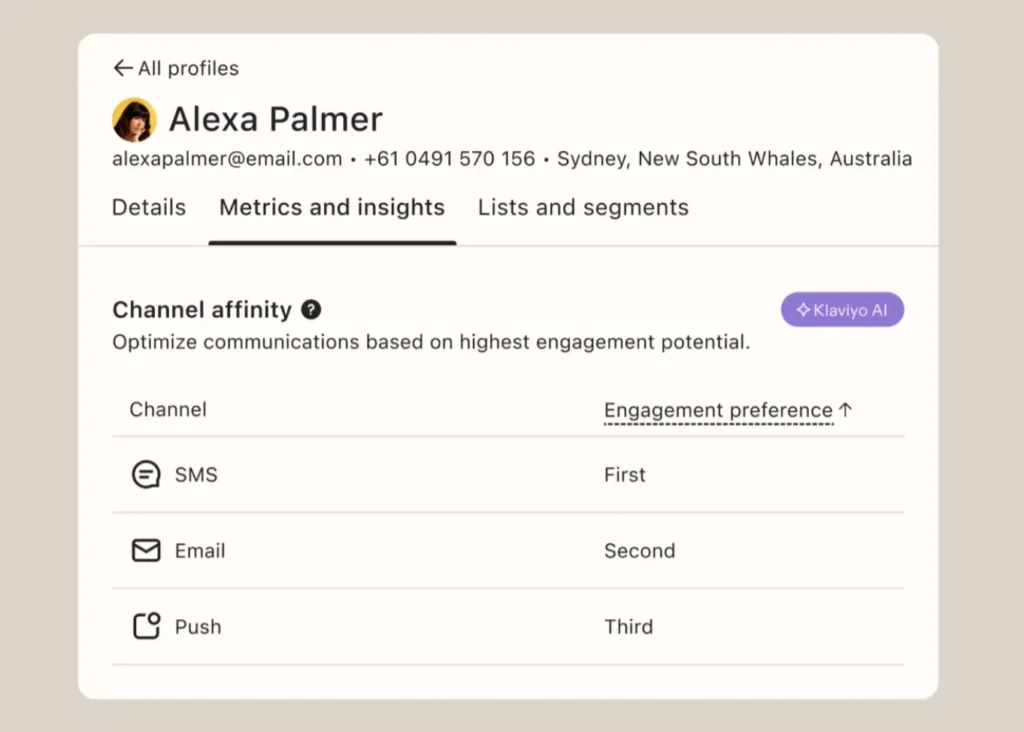
Klaviyo is a complete CRM solution for B2C. It combines marketing campaigns, customer platform, and analytics in one connected system.
It’s a very comprehensive system, though some features may feel a bit limited. If you’re looking for a CRM that covers a lot of ground without going too deep in each area, it’s Klaviyo.
Key features for ecommerce
- Advanced segmentation based on behavior, purchase history, and predicted lifetime value
- Pre-built and customizable automation flows for welcome series, abandoned cart, post-purchase, win-back, and more
- Real-time syncing of customer and order data
- Omnichannel campaigns across email, SMS, WhatsApp, push notifications, and in-app messaging
- Dynamic content and product recommendations in emails
- A/B testing and performance tracking tools
- Drag-and-drop email editor with templates
- Customer service tools like chat, sign-in experience, order tracking, etc. (available through a separate package)
- Native integration with Shopify and other major ecommerce platforms
Klaviyo pricing
It starts with a free plan for up to 250 active profiles and 500 email sends per month. From there, pricing moves to $20/month for up to 500 profiles and 5,000 monthly email sends.
Klaviyo’s pricing can be a bit tricky to navigate. There are core marketing plans, plus add-ons for things like advanced analytics and customer reviews, which makes it hard to estimate the total cost at first glance.
4. Omnisend
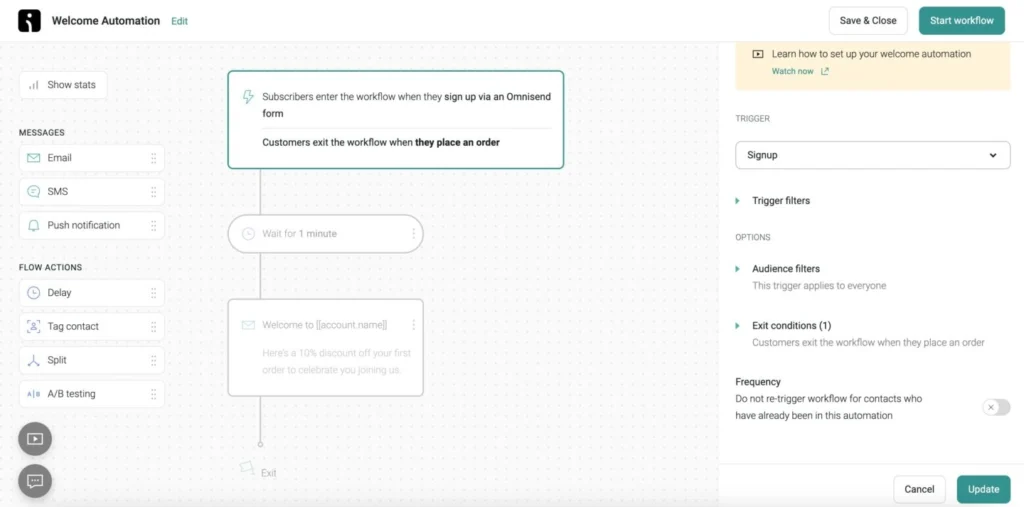
Omnisend is an all-in-one marketing platform built for ecommerce. It’s a favorite among Shopify users due to its smooth integration.
Many marketers describe it as a simpler, more user-friendly alternative to Klaviyo — but with fewer advanced features.
It’s not a full CRM in the traditional sense — you won’t get deep customer data or complex segmentation. But if your main focus is running targeted campaigns and automating key touchpoints like cart recovery or post-purchase follow-ups, Omnisend handles that really well.
Key features for ecommerce
- Pre-built automation workflows for welcome, abandoned cart, post-purchase, product review requests, and more
- Multichannel campaigns across email, SMS, push notifications, and more
- Segmentation based on shopping behavior and lifecycle stages.
- Drag-and-drop email and form builder with product pickers
- AI copy generator
- Dynamic product recommendations and discount blocks
- Performance tracking with sales attribution and campaign reports
- Native integrations with Shopify, BigCommerce, WooCommerce, Wix, and others
- Built-in tools for popups, sign-up forms, and landing pages
Omnisend pricing
Omnisend’s free plan includes up to 500 emails per month. Paid plans start at $16/month for up to 500 contacts and 3,000 emails per month.
All plans offer the same core features (except for personalized product recommendations and advanced analytics in the Pro plan) — what changes is the number of emails and SMS credits included.
Discover more Omnisend alternatives.
5. Freshworks
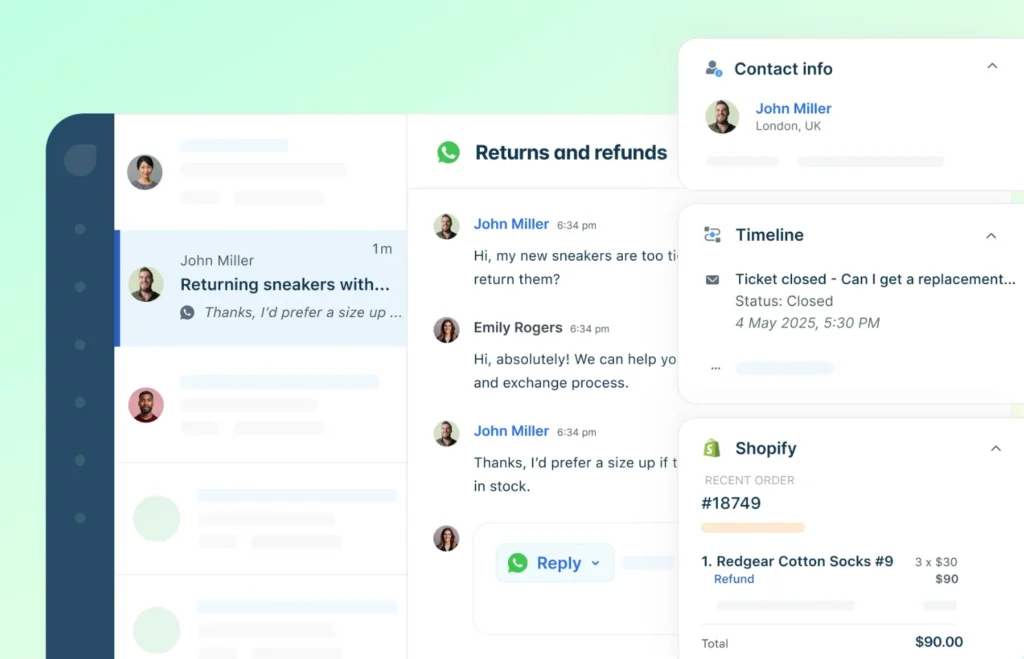
Freshworks is a full-suite CRM that’s popular across industries, but it also has solid tools for ecommerce brands. It leans more into the sales and support side than marketing-focused platforms like Klaviyo or Omnisend.
It has a built-in chat and helpdesk, which makes Freshworks a great pick if you’re looking to improve customer service alongside tracking sales and customer behavior.
Key features for ecommerce
- Built-in live chat, chatbot, and AI-powered support system
- Shared inbox for handling order-related emails (like shipping delays or refund requests)
- Customer timeline that shows purchase history, previous conversations, and website activity
- Workflow automations for tagging, routing, and responding to support tickets
- Custom customer support reports
- Integrations with Shopify, WooCommerce, BigCommerce, and more
- In-app messaging and proactive support (e.g., nudging a user who’s stuck at checkout)
- Mobile CRM
Freshworks pricing
Freshworks has a wide range of plans, each starting with a free option. For ecommerce brands, Freshdesk Omni is the most relevant — starting at $35/agent/month. There are also dedicated CRM plans, but they’re better suited for B2B sales teams.
6. Salesforce
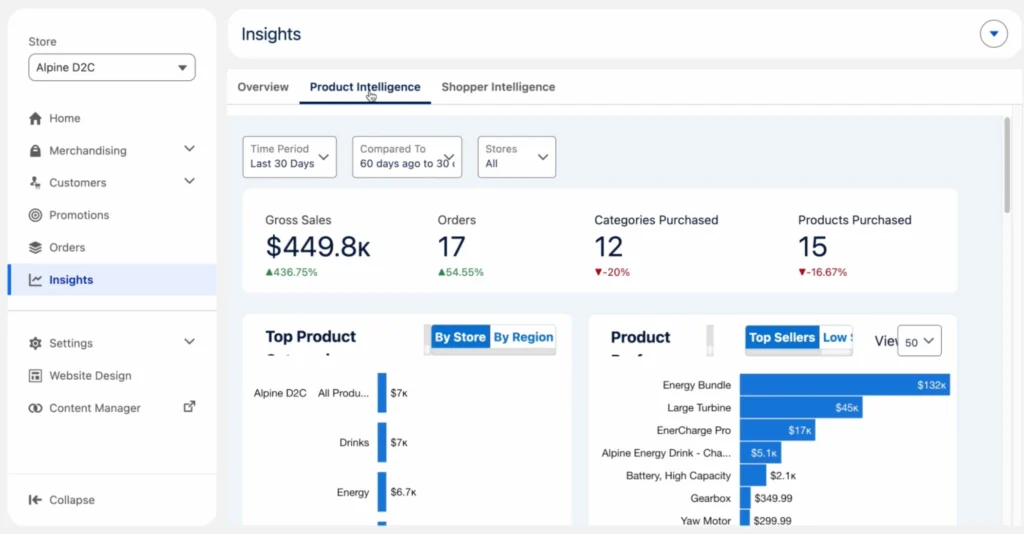
Salesforce is a heavyweight, highly customizable CRM that can be shaped to fit the needs of large ecommerce brands. It’s a great fit if you want full control and don’t mind putting in the time (and budget) to tailor it exactly to your needs.
It’s got everything: marketing, store management, service, automation, you name it. But fair warning: it’s not plug-and-play. You’ll need a dev team (or at least a consultant) to get the most out of it.
Key features for ecommerce
- Unified platform for managing online storefronts, orders, promotions, and product catalogs
- Email and SMS automation
- AI-powered product recommendations, search, and personalization
- Real-time customer profiles with cross-channel behavior tracking
- Built-in tools for A/B testing, performance tracking, and revenue attribution
- Scalable infrastructure to support high traffic and complex catalogs
- Extensive ecosystem of third-party apps and integrations
Salesforce pricing
Salesforce doesn’t offer a free plan. The Starter plan starts at $25/user/month with out-of-the-box email marketing and sales processes. For $100/user/month, you unlock more advanced customization options.
What’s really interesting is their pay-as-you-go option, where you pay 1% of your gross merchandise value and get access to DTC storefronts, payment processing, and order management.
Discover more Salesforce alternatives.
7. HubSpot CRM
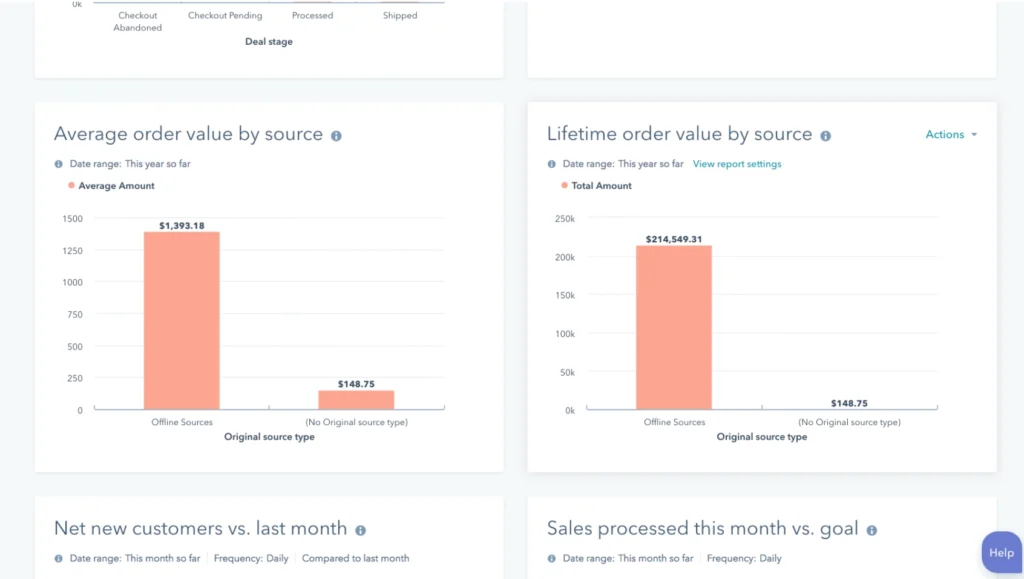
HubSpot CRM is a popular, easy-to-use platform that combines marketing, sales, and customer service tools all in one spot. It’s as popular and top of mind as Salesforce but isn’t as technical or customizable.
It’s not as deep on ecommerce-specific features as some others here, but it makes up for that with a super-friendly interface and one of the most generous free plans. On the downside, once you start paying, it can get expensive pretty fast.
Key features for ecommerce
- Centralized CRM that stores customer data, purchase history, and website interactions in one place
- Built-in marketing tools for email campaigns, automation workflows, and landing pages
- Integration with Shopify, WooCommerce, and other major ecommerce platforms
- Segmentation and personalization tools for targeting based on shopping behavior
- Live chat and chatbot for customer support and lead capture
- In-depth analytics dashboards for tracking revenue, conversion rates, and customer lifecycle stages
- App marketplace with hundreds of integrations for payment processing, reviews, loyalty programs, and more
HubSpot CRM pricing
HubSpot CRM is a part of the HubSpot Customer Platform packages. It starts with free tools that cover a wide range of functionality, though with strict limits on usage. The next step up is the Starter plan at $15/month/seat.
From there, there’s a significant leap to the Professional plan at $1,450/month for 5 users, which unlocks advanced automation, reporting, and sales tools for growing teams.
Discover more HubSpot competitors.
8. Zoho CRM
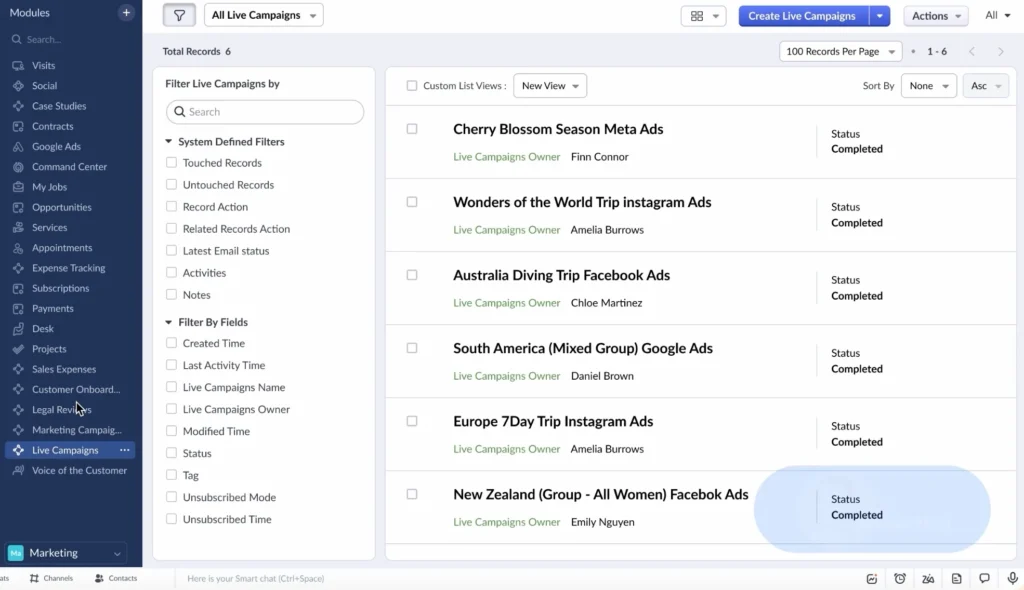
Zoho CRM is a flexible, budget-friendly platform that works for both B2B and B2C but also offers features that cater to ecommerce brands.
If we were to compare it to HubSpot, think of Zoho as Android and HubSpot as Apple. HubSpot feels sleeker and more polished right out of the box — you can start using it without tweaking much.
Zoho, on the other hand, might take a bit more setup, but it can match (and in some cases exceed) HubSpot’s capabilities once configured.
A big part of Zoho’s appeal is its massive ecosystem of interconnected products. You can plug your CRM into tools for marketing, support, accounting, analytics, and even build your own ecommerce store with Zoho Commerce.
Key features for ecommerce
- Centralized customer database with purchase history and interaction logs
- Lead and deal tracking to monitor sales opportunities from multiple channels
- AI assistant (“Zia”) for sales predictions, sales automation, and workflow suggestions
- Email and SMS campaign tools with segmentation capabilities
- Social media integration to track and engage with customers directly from the CRM
- Integration with Shopify, WooCommerce, and other ecommerce platforms
- Customizable dashboards and reports for sales and marketing performance
Zoho CRM pricing
Zoho CRM has a free edition for small businesses. Paid plans start at $20/month.
Discover more Zoho alternatives.
9. Bitrix24
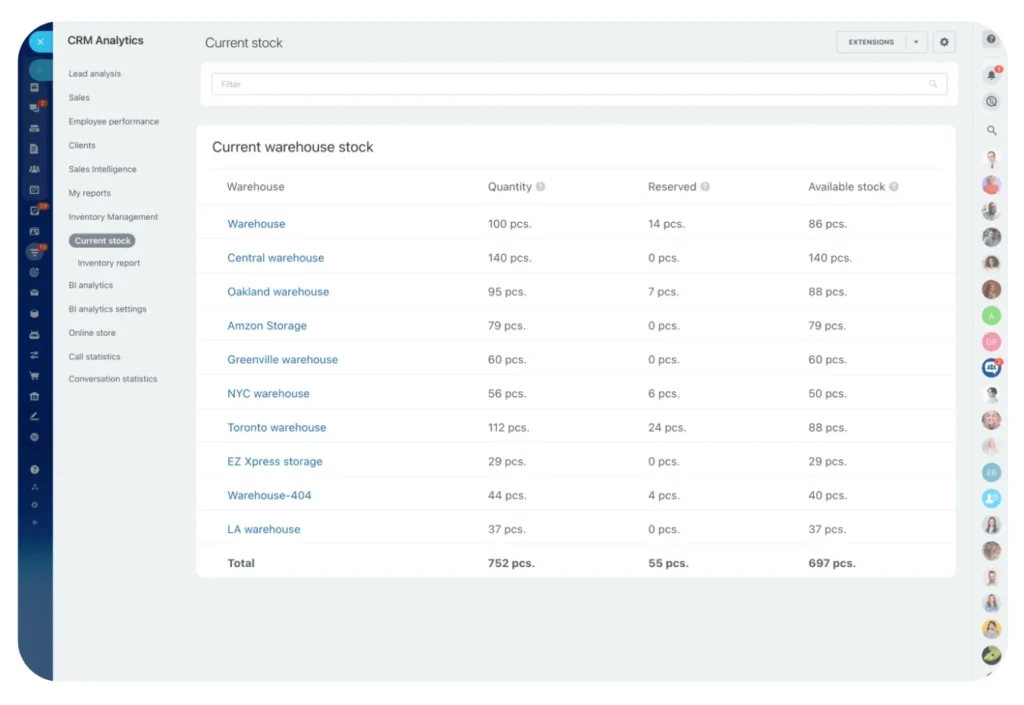
Bitrix24 is another comprehensive CRM with a strong set of ecommerce features built into its core.
It has a higher entry point than Zoho CRM or some of the other tools above, but it also includes capabilities you won’t typically get in entry-level plans elsewhere — like the ability to build and run an online store right out of the box.
Key features for ecommerce
- Built-in CRM with contact and sales tracking
- Online store builder with integrated payments and shipping options
- Live chat, chatbot, and social media messaging tools
- Multichannel marketing workflows with bulk email, SMS, Telegram, Facebook Messenger, robocalling, WhatsApp, Viber, and Instagram Direct Messenger
- Inventory and order management tools
- Detailed analytics on sales, customer behavior, and campaigns
- Integrations with Shopify, WooCommerce, payment gateways, and more.
- Mobile CRM
- AI-powered assistant for CRM tasks and copy generation
Bitrix24 pricing
Bitrix24 has a free plan, and paid plans start at $81/month. It might feel a bit pricey, but that covers up to 50 users.
If you want to host your store on Bitrix and handle payments, the big benefit is you won’t pay any platform processing fees, and there’s no revenue cap on any plan.
10. Pipedrive
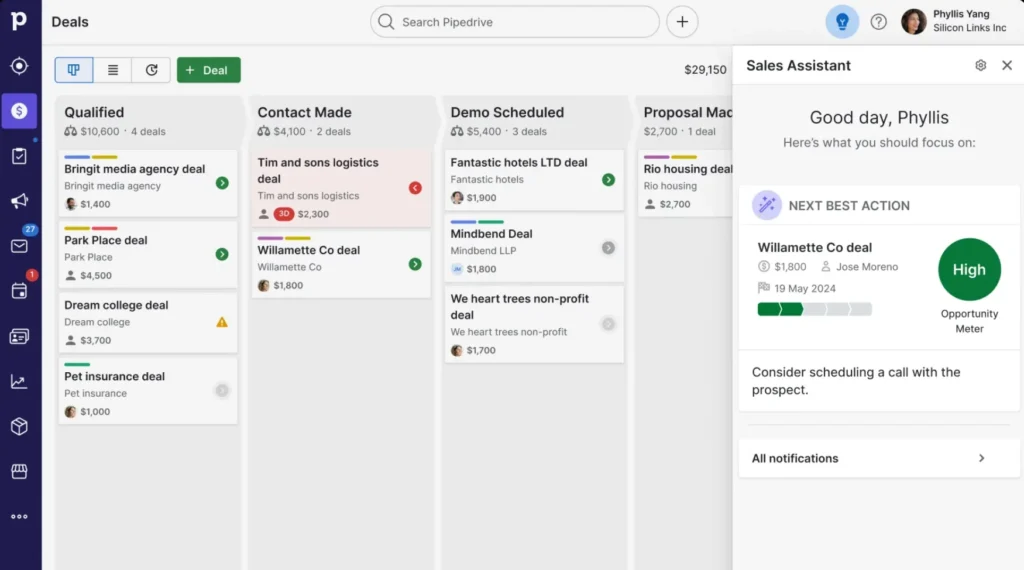
Pipedrive is a straightforward CRM built around visual sales pipelines and an easy-to-use interface. It’s not an all-in-one system packed with bells and whistles — and that’s exactly why some teams choose it.
Most people think of it as a B2B tool, but it can fit just as well in an ecommerce setup — for instance, if you handle wholesale accounts or manage high-value orders.
It’s very sales-focused, so you won’t get built-in store management, but Pipedrive integrates with Shopify, WooCommerce, and other ecommerce tools.
Key features for ecommerce
- Customizable pipelines for tracking orders, leads, or wholesale deals
- Contact management with purchase history and communication logs
- Workflow automation for follow-ups, reminders, and deal progression
- Email integration with tracking for opens and clicks
- Integrations with ecommerce platforms and marketing tools
- Mobile CRM
Pipedrive pricing
Pipedrive doesn’t offer a free plan, just a free trial. Paid plans start at $24 per user/month, but to get email automation, you’ll need the $49 per user/month plan.
Discover more Pipedrive alternatives.
11. Capsule
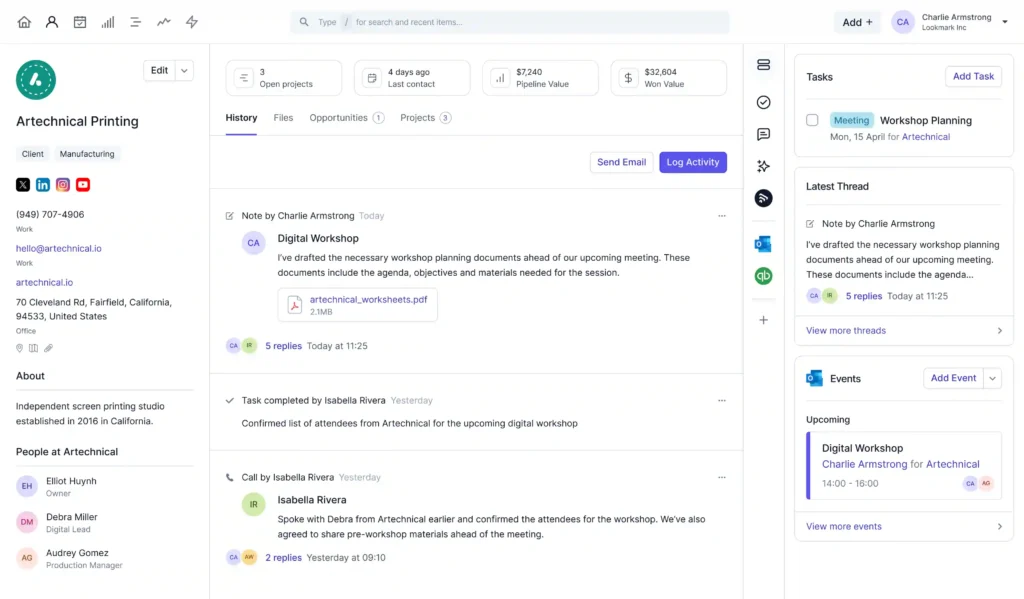
Capsule is a lightweight CRM with project management and email marketing features. It keeps things deliberately simple.
Instead of trying to be your store, your omnichannel marketing platform, and your help desk all at once, Capsule focuses on organizing your workflows.
Much like Pipedrive, it’s not packed with ecommerce-specific features, but it does cover the basics: contact management, email marketing, and integrations with tools like Shopify, Xero, and QuickBooks.
Key features for ecommerce
- Contact management with tags and custom fields for purchase history and preferences
- Visual sales pipeline and collaboration tools
- Task and calendar tools for follow-ups and deadlines
- Email integration with Gmail, Outlook, and other providers
- Integrations with ecommerce, accounting, and marketing platforms
- Customizable dashboards and reports
- Mobile app
Capsule pricing
Capsule offers a free plan that includes up to 250 contacts. Paid plans start at $18 per user/month and include up to 30,000 CRM contacts.
Discover the best CRM software for small businesses.
Find everything you need in an ecommerce CRM, nothing you don’t
The truly right ecommerce CRM for you is the one that gives you everything you need without cluttering your workflow with features you’ll never use. That’s hard to find.
The best tools, like Brevo, focus on what matters most: organizing customer data and enabling personalized communication.
With everything you need in one platform — and nothing you don’t — you won’t be slowed down by a complicated interface or unnecessary clutter.







